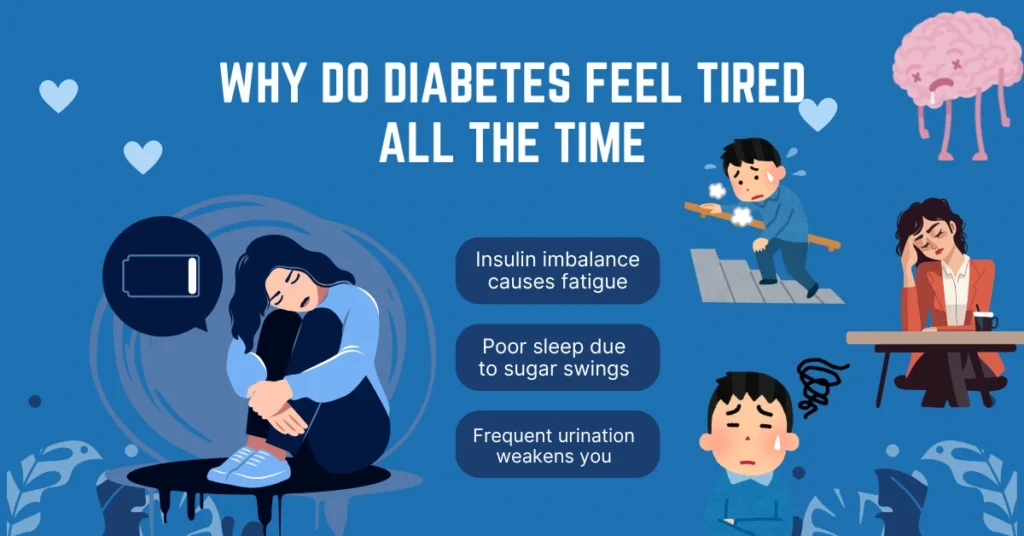Today, we’re going to discuss why diabetes patients feel tired. First, let’s clarify that tiredness and fatigue are different. When a person feels tired, a little rest or sleep can make them feel better. But when we talk about fatigue, even after resting, one doesn’t feel better and often feels very weak.
Table of Contents
There are two types of diabetes
Type 1 Diabetes. In Type 1 diabetes, our immune system becomes weak. This means the body stops producing insulin. This happens because the body’s immune system starts working incorrectly. It mistakenly destroys the insulin-producing cells (Beta Cells) in its own pancreas, believing them to be harmful, like a virus or bacteria. This is why it does that. Its treatment involves daily insulin injections because, without insulin, the body cannot control blood sugar, and it causes a lot of problems. This mostly occurs in younger people or during adolescence.
Type 2 Diabetes Type 2 diabetes mostly occurs in older people. In this, diabetes patients have insulin resistance. This means our body produces less effective insulin or doesn’t use insulin properly. Insulin is a hormone produced by an organ called the pancreas inside our body. This hormone works to send glucose (sugar) from our blood into the cells so that the body can produce energy from that glucose.
What is Diabetes Fatigue?
Feeling tired in diabetes is called fatigue. The biggest reason for tiredness in diabetes is that glucose doesn’t reach the cells. When insulin isn’t produced properly in our body, the glucose from food remains in the blood. When insulin isn’t produced effectively, the body’s cells don’t get energy, and because of this, we feel tired.

Major Causes of Tiredness in Diabetes
High Blood Sugar (Hyperglycemia)
High blood sugar, or hyperglycemia, occurs when the glucose level in our blood rises above normal. If it’s above 125 mg/dL when fasting, or above 180 mg/dL after a meal, it’s considered high blood sugar. In this condition, the patient feels excessive thirst, urinates frequently, experiences dry mouth, feels tired, and if sugar increases too much, it can lead to serious complications. When blood sugar is high, the body expels more water through urine, leading to dehydration, which makes one feel weak and tired. Diabetes patients feel tired due to high blood sugar for several reasons:
Symptoms:
- Increased urination
- Increased thirst
- Dry mouth
- Weight loss
- Blurred vision
Low Blood Sugar (Hypoglycemia)
When glucose in our body falls below normal, meaning blood sugar is below 70 mg/dL, this condition is called low blood sugar. Some of its causes are:
Symptoms:
- Shaking
- Sweating
- Restlessness, nervousness
- Feeling hungry
- Dizziness
- Feeling tired
- Irritable mood
- Blurred vision
Insulin Resistance
Insulin resistance is a condition where our body’s cells do not respond to the insulin hormone, which causes blood sugar to remain high. Insulin’s job is to deliver sugar from the blood to the cells so they can produce energy. But when cells start ignoring insulin, blood sugar begins to rise, and because of this, diabetes patients feel tired.
Why does this happen?
- Excess weight (increased fat around the abdomen)
- Lack of physical activity
- Eating too much junk food, oily, and sweet foods
- Family history of diabetes
- Stress and tension
- Poor or insufficient sleep
- Increasing age
Dehydration
When the sugar level in the body becomes high, our kidneys try to excrete sugar through urine with excess water, which causes us to go to the washroom frequently. Due to this, a lot of water is lost from our bodies, leading to dehydration.
Why does dehydration cause tiredness?
- When there is less water in the body, the blood becomes thicker, which prevents oxygen and energy from reaching the cells properly.
- Lack of water prevents the body from functioning properly, leading to tiredness and weakness.
- Even slight dehydration can cause headaches, dizziness, and fatigue.
Infections and Illness
For diabetes patients, infections and illnesses create more problems because when they get an infection or illness, their body uses more energy to fight them. This happens because high blood sugar weakens our body’s immune system. Due to this, diabetes patients have to work harder to fight infections or illnesses. Due to infection, the blood sugar level often fluctuates. This extra effort and energy make diabetes patients even more tired, making their bodies feel weaker.
Diabetes patients should always take care of themselves and take extra care and rest when they have an illness or infection. They should also seek immediate treatment from a doctor so they can recover quickly and reduce tiredness.
Stress and Emotional Pressure
Diabetes patients should not take too much stress because when a person takes a lot of stress, stress hormones increase in their body. And these cause blood sugar to fluctuate. In addition, emotional tension like anger, sadness, or worry also drains the body’s energy. When the mind is too troubled, it also has a very bad effect on our body. This is also why diabetes patients often feel more tired, even if they do less physical work. They still feel weak or tired.
Therefore, reducing stress, keeping your mind calm, and staying positive are very important for diabetes patients.
Poor Sleep Quality
If sleep is not complete, anyone will feel tired and sluggish. But for diabetes patients, this problem increases even more because, due to fluctuating blood sugar, sleep is disturbed throughout the night. Sometimes due to the need to go to the bathroom, sometimes due to thirst, or sometimes due to body pain, sleep is not fully achieved.
Due to incomplete sleep, our body does not get enough rest and feels very tired and stressed. Due to this, stress hormones also start increasing a lot, and blood sugar also starts getting disturbed.
Getting good sleep is important not only for diabetes patients but for everyone. However, its effect is more pronounced in diabetes, so diabetes patients need to pay more attention. Eating light food before sleeping, staying stress-free, and controlling blood sugar prove helpful.
Side Effects of Medication
Every medicine doesn’t just control the disease, but sometimes some medicines can have unwanted effects on the body. In the treatment of diabetes, some medicines that control blood sugar also have side effects. For example, some medications can cause dizziness, nausea, loss of appetite, or sometimes sleep problems in some patients. These side effects reduce the body’s energy. These medicines can make one feel sluggish, weak, and tired throughout the day.
Often, these side effects increase when we take a higher dose of medicine, or if a particular medicine doesn’t suit a patient. Therefore, it is important to consult a doctor immediately if any side effect is felt. The dose of the medicine might be reduced, or an alternative medicine might be given so that you can feel better.
How to Manage Diabetes-Related Fatigue?
To avoid tiredness caused by diabetes, not only medicines are important. Small changes should also be made in lifestyle, which can help in avoiding this.
- Keep Blood Sugar Under Control. First of all, we need to focus on keeping our blood sugar in the normal range, neither too high nor too low. Regular checkups should be done. Regular checkups should be done so that if our blood sugar is low or high, it can be immediately managed.
- Eat a Healthy and Balanced Diet. Eat a diet rich in fiber, protein, and complex carbohydrates. Avoid junk food, oily, and sugary things. Because the biggest danger to us is from these things. Eating healthy things in small quantities throughout the day is beneficial. And we stay healthy with these things.
- Improve Your Sleep: Sleep on time and get good sleep. It is very important to get 7-8 hours of sleep. Avoid using a mobile or TV before sleeping. And don’t take stress about anything. Eat a light meal and feel relaxed.
- Exercise Regularly. Exercising is very important because excess weight is also not good for sugar. Weight should always be maintained, and light exercise should be done daily. Morning walks, yoga, or stretching also keep the body active. Exercising helps the body relax, reduces stress, and most importantly, keeps the body relaxed.
- Reduce Stress and Emotional Pressure: Share your thoughts or feelings with others, like your friend or a trusted person. Sharing these things will lighten your mind, and you will feel better. Meditate, engage in hobbies, or pursue your interests. This will keep you relaxed. Too much stress can also increase sugar.
- Pay Attention to Side Effects. If you feel any problems with the medicine or feel too tired, consult a doctor immediately. The dose of medicine might be changed.
- Pay Attention to Infection and Illness. If you feel tired due to any infection or illness, seek immediate treatment and give your body rest. And try to avoid infection or illness as much as possible, and rest.
Conclusion
Feeling tired in diabetes is common, but it should not be ignored because it can be risky. Blood sugar should be kept under control, good sleep should be taken, and a healthy diet and stress-free living help in managing this problem. With a little caution and taking good care of your health, by improving and maintaining your routine well, we can live an active and energetic life even with diabetes.




